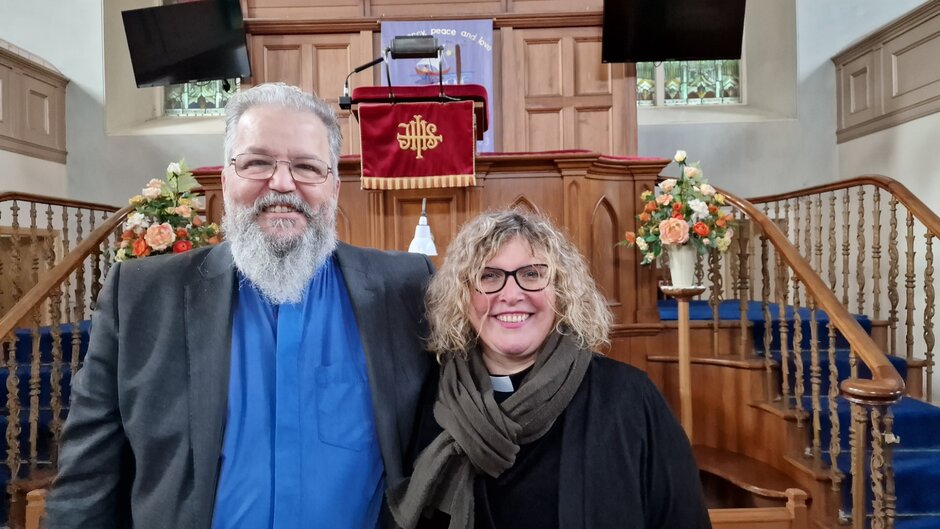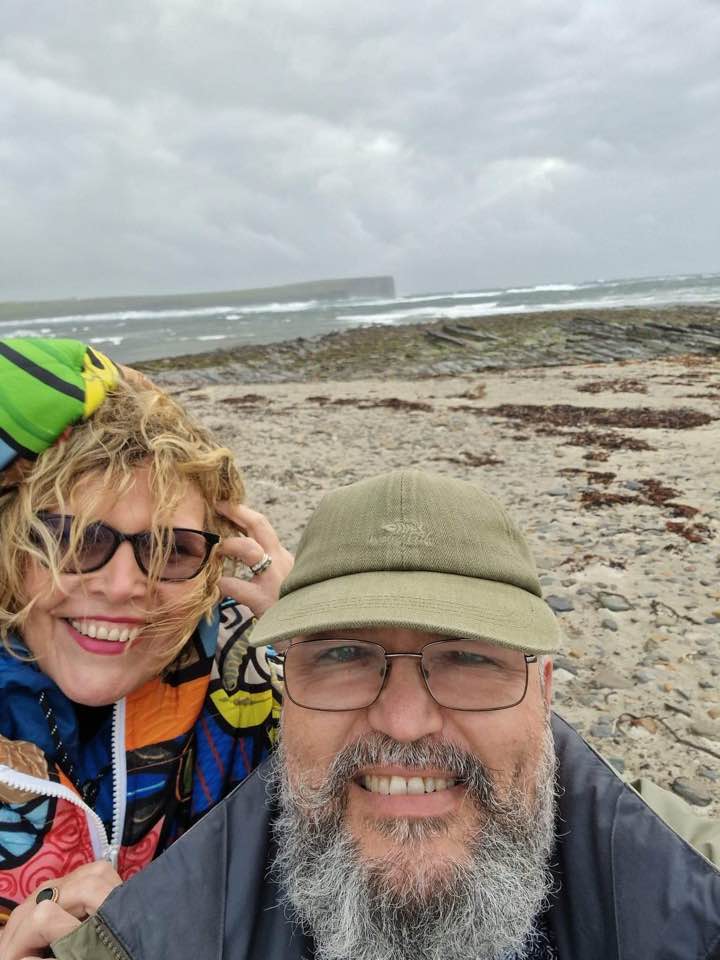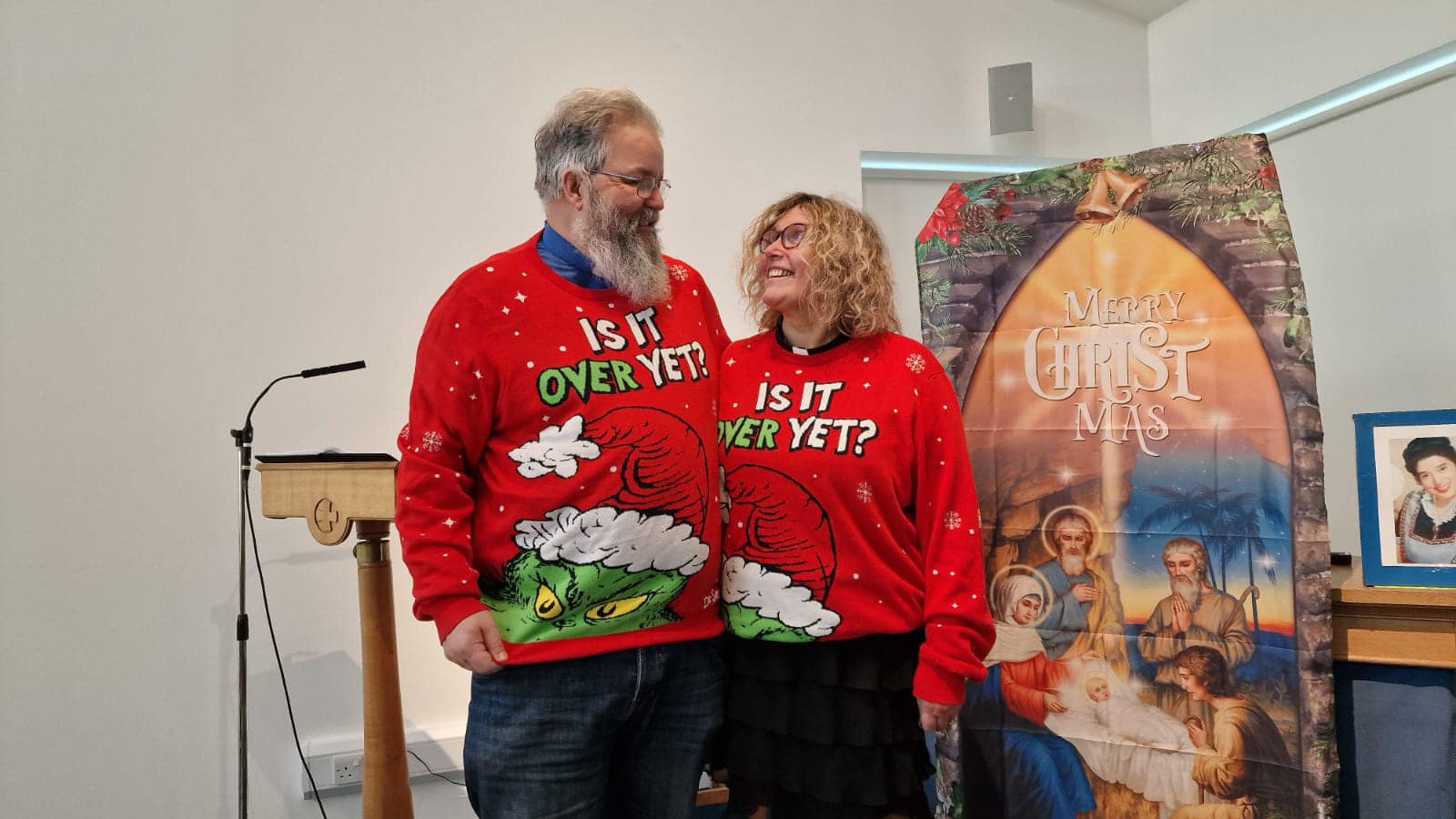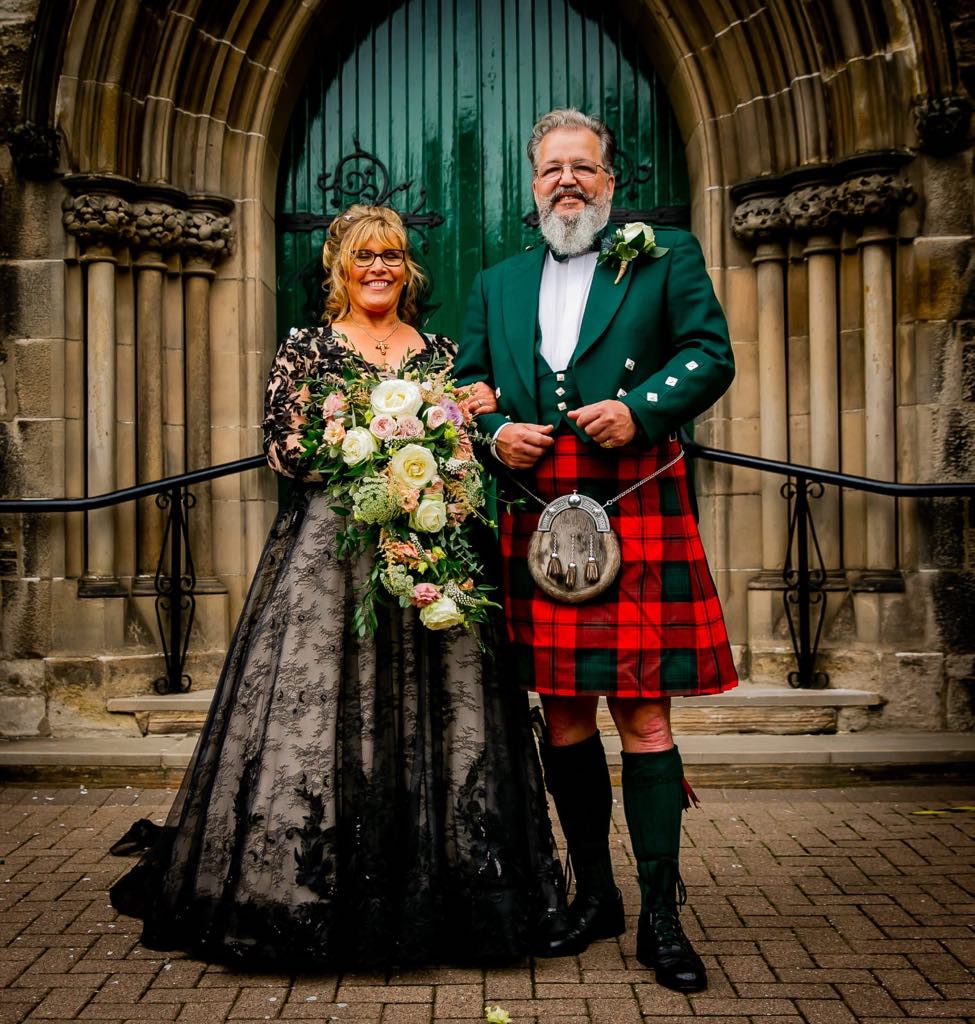April 2024: Rev Kerr Wintersgill and Rev Moira Taylor Wintersgill
The Church of Scotland's Talking Ministry series shares personal stories from those serving in Christian ministry, along with resources filled with questions, prayers and reflections to help encourage reflection on how God might be calling you at this time.
For April, Rev Kerr Wintersgill and Rev Moira Taylor Wintersgill reflect on their own journeys towards ministry and their current role as joint ministers to two very different congregations on the West Mainland of Orkney.
My ministry: Rev Kerr Wintersgill and Rev Moira Taylor Wintersgill
Glaswegian Kerr, and Moira from Portobello in Edinburgh, met and married while training for ministry with the Church of Scotland.
The couple were ordained and inducted as joint ministers of Milestone Community Church at Dounby in the north Orkney Mainland in November 2022, a role they combined with work as joint mission development officers for the Orkney Islands.
More recently, the couple have become joint ministers at Stromness Church in Orkney's second largest town.
What led you to a career in ministry?

Kerr: When I first felt a call to ministry, my first thought was: "God! Are you having a laugh?"– I failed my English Higher twice and You want me to write an essay twice a week?" But I felt I had to be faithful and follow on. When I wasn't successful, I was mightily relieved.
Then, a few years later, a reading from Jeremiah about the walls of Jerusalem being torn down to be rebuilt gave me the strong sense that was God saying "it's time to rebuild you, so I reapplied.
I was an elder in Callander Kirk and involved in various roles in the church, but when I split from my wife, I resigned my eldership because I didn't feel I was a fit elder because I was divorced. This was why the words of Jeremiah about the walls needing to be rebuilt resonated so deeply with me.
God! Are you having a laugh? – I failed my English Higher twice and You want me to write an essay twice a week?
Moira: My family were nominally Church of Scotland, so I went fairly regularly to Sunday school and for a short while youth fellowship. For as long as I can remember I believed in God but didn't know much about the Holy Spirit and even though I joined the Church in 1992, I wouldn't say I had a live faith.
I got married and had two daughters within two years and went to live in Anstruther in Fife, where my ex-husband was teaching, but felt a long way from family and friends.

I went to bed one night feeling really down about the state of the world and a bit lonely and suddenly I was flooded with hope and light. I got up the next day and felt the same and needed to speak to someone about this profound experience. Having been involved with the Church of Scotland in my past, my first point of contact was to find out who the minister was in Anstruther at the time, and speak with him. It turned out that he was about to run his first Alpha course and I went along. I remember feeling quite anxious about it, because it was bound to be full of "good Christiany types", but that feeling went away quickly. They were an amazing bunch who were all on a journey together. That would be where my life turned around and faith became a major part of my life.
I became an elder in Duns in the Borders and ran holiday clubs and started Kids Kirk and did a lot in lay leadership with the church. I first felt a call around 1998, but I just dismissed that because I felt that I didn't know enough about the Bible. Then one day, many years later, I was hanging the washing out and I felt God say: "You are going to be a minister and a minister's wife."
At that point my husband didn't believe, so I thought that perhaps at some point he would come to faith and go into ministry, never imagining that I was going to meet Kerr!
My middle daughter, Caroline, died in 2015 and my marriage broke down. I moved to Edinburgh with my youngest daughter Maisie Grace, who was then aged five, and got a job as a pastoral assistant at Broomhouse with Rev Michael Mair. I absolutely loved that, but that sense of call was still there, so I decided to go into discernment and if ordained ministry turned out to be for me, so be it, and if not, then great, because I loved my job.
I remember driving to my national assessment conference in Dunfermline, thinking that I would rather stick pins in my eyes, but the first people I met were Kaye Gardiner and Elsie MacRae and we had a fantastic weekend – just great fun! I was selected for full-time Word and Sacrament and entered training in 2017.
On my third conference in 2019, I met Kerr, who was at his first conference at St Andrews. After that, we chatted on Facebook and we felt fairly quickly that God had brought us together. It changed the direction of our ministry because neither of us expected to be anything other than a minister on our own.
How have you found working together as a couple in ministry?
Moira: Whilst in my final year at New College, I did eight-months as a locum for Gorgie Dalry Stenhouse, a lot of it during the second lockdown. I did a lot with Kerr for that and we found that when we got the opportunity, we worked really well together.
We have got completely different styles of preaching and different strengths and weaknesses, but we have a similar approach to what ministry is. That's why it works.
Kerr: Moira is the preacher, I'm the encourager. Moira is the ideas person and very much about thinking outside the box. I do the good simple Presbyterian stuff, and I am good with IT and good with figures and good at running a session.
Moira: Kerr is a superb moderator. He has an amazing ability to maintain his energy and maintain his composure and be very, very fair and be very solution focussed.
Kerr is a good sustainer as well. I am a pioneer at heart and, led by the Holy Spirit, I find gaps of need and fill them. Even before I was ordained, at the church in Duns, the Holy Spirit gave me the vision for Kirk Kids. I put huge energy into it: got it up and running, ran it for a year, and then passed it on and it is still going now. That could be problematic if I was in ministry by myself.
How would you describe your approach to mission and church?

Kerr: For me, it's a lot to do with relationships and about being a community. Before you can preach the Gospel, you have to have a relationship with folk. Moira's lovely take on it is that the sanctuary should be God's living room where people are comfortable just to come as they are. They don't have to be dressed up in their Sunday best.
Moira: We both try and be authentically us, warts and all, and I think that allows others to be the same. In church, there is an amazing atmosphere. When we lead worship together we can have a bit of banter which I think helps drop the masks we all wear. There have been times in my own life when I haven't gone to church because I didn't feel comfortable sharing the negatives in my life, or I felt I might be judged, but I strongly believe that church has to be a place that people feel they can go to on their worst days as well as their best days, and somewhere they can go to explore when they feel a spark of something spiritual.
We don't want to be ministers who say: come to church, believe what we believe, and act the way we do and you will be welcome.
We need to have space for people who don't necessarily believe all that we do, but feel that there is something they need to explore and ask the question: "So, tell me what you believe?"
Was it a surprise to find yourselves called to Orkney?
Moira: Yes! I thought I'd be in a priority area because I loved working in Broomhouse so much.
Kerr: And I was single at the time and I thought I was going to have a fairly peripheric ministry of five years there and five years here because I would be able to move round.
But we both feel called to Orkney and certainly don't feel that we are going to be leaving it any time soon. We have both fallen in love with the place, its scenery and the people.
Moira: God has given us such love for the people we have been placed amongst and it's the kind of scenery which speaks to my soul, with its huge seas and the big skies. It stops me in my tracks every day.
You now have two quite separate charges, so how have you been able to balance the two different churches?
Kerr: It's an interesting experience after being at Milestone Church for 18 months and being established to going somewhere to start again. It's going to change again because Orkney is going to become a single parish and we are going to be taking on responsibility for another two parishes.
Milestone is a new church, formed when what were historically four parishes came together and the decision was made to close all the buildings and replace them with a new energy efficient, flexible building.

Stromness is a long-established parish church which hasn't had the easiest journey. Since the summer of 2022, when we first came up to Orkney, they went from, having a minister, a manse and a church to their minister retiring, the manse being condemned and being told that the building was going to close.
Moira: In Milestone, we have a really eclectic mix of people holding a broad range of theologies, but it works, whereas it is very early days for us in Stromness and we don't really know our people yet, but they seem lovely, if a little bruised.
Saying that, we have already tried to do some new things. On Easter Sunday, we instigated a 9am service at The Pier in Stromness, which we led together with our colleagues from the Episcopal church and the Baptist church. About 50 folk came from different denominations and the weather was glorious which was just as well as we had no Plan B!
I always try to get along to the Orkney Island Leaders' Meeting, which is held once a month and brings together people from all the different churches. Interestingly, we all have the same sense about unity and that there needs to be some sort of repentance about the divisions that have occurred, and the way churches have tended to focus more on their differences than their shared love of God. This has led to a monthly prayer and worship event where all the churches come together and that feels like a place we all need to go as people of faith. We need to have respect for one another's differences, but realise that we don't have to agree about everything to come together.
Kerr: We are joint ministers in both Milestone and Stromness. That has been hard for some people to get their head round. Even the fact of a couple being in ministry together is difficult. I had someone say: "Every minister says they are in partnership with their spouse". But we really are a partnership!
Moira: Another thing we share is that our ministry is led by the people. We didn't arrive in Dounby with a list of things we wanted to do. We seek God's leading to find out where the gaps are and what people wanted to happen. It is the same for Stromness. We need to get to know the people and the town and the schools and get a sense of where the need is.
Kerr: For us it's about building a sense of community, both individually and together, and helping people develop skills as worship teams.
Along with your parish responsibilities, you are chaplains for the new St Magnus Way, a 58-mile pilgrimage route to the saint's final resting place at St Magnus Cathedral. What does this involve?
Moira: Last year we organised a pilgrimage of the whole St Magnus Way done in stages. That started in April and finished in September and the positive thing about that was that it was very much local people and people from different churches that came along.
We have still to decide what we are doing this year. We would like to ground it in some way so that the people who come to the island to do the St Magnus Way have some way to tap into the faith of the island and the people of the island.
Kerr: They have a very good app I want to help develop with resources for each of section of the walk by means of a guided reflection. It is those sorts of resources we want to make available for people doing the walk.
What keeps you excited about ministry?
Moira: I don't feel as if I am doing a job. It is such an amazing privilege to do this. It's just so energising.
Of course, I doubt myself and worry about whether I am doing well enough for God and our communities but that is when call is so important-I am not doing this alone – as long as I stay rooted in God I'm OK. Life in ministry is so varied – for example one day I went from our breakfast initiative, the Toast Stop, to doing messy Church in school to leading a stillness service in Stromness, then back to choir practice in Milestone, then an Alpha Course. It's an absolute dream to be doing all these different things with all these different people.
Neither one of us has the desire to be set aloft. We don't put on "our minister face" or pretend to be perfect – we are far from that! We've both been through a lot in life and had different experiences, good and bad. We have both done things we are ashamed of and had moments when we have shone, but it's about owning that and saying: I am who I am. I am human, I am flawed, but even so, God will use me to build His kingdom.
There are places in life where you are almost engulfed by blackness, but knowing the truth that the light shines in the darkness and the darkness can't overcome it, is something I feel passionate about sharing with people, and that life is the deep pure love of God.
Kerr: The same as with Moira, it's a love of the folk that keeps me going. It's not really work at all.

May Discernment Resources: Shaped by Christian Community
The value of each ministry
When we begin to talk about and discuss the value of each person within the church and how the whole people of God contribute their individual parts to make up the whole, one of the most obvious bible passages that springs to mind is "one body, many parts" from 1 Corinthians 12. However, in a recent exploration session for those considering becoming elders, it was really fruitful to look at the passages on either side of this well-known and well-worn text.
Read this passage out loud, twice. Listen and hold onto in your mind or even write down on the second hearing which parts jump out and stick with you. How is God speaking to you about the part you play in the ministry of the whole people of God?
Gifts of the Holy Spirit
12 Brothers and sisters, I want you to know about the gifts of the Holy Spirit.
4 There are different kinds of gifts. But they are all given to believers by the same Spirit. 5 There are different ways to serve. But they all come from the same Lord. 6 There are different ways the Spirit works. But the same God is working in all these ways and in all people.
7 The Holy Spirit is given to each of us in a special way. That is for the good of all. 8 To some people the Spirit gives a message of wisdom. To others the same Spirit gives a message of knowledge. 9 To others the same Spirit gives faith. To others that one Spirit gives gifts of healing. 10 To others he gives the power to do miracles. To others he gives the ability to prophesy. To others he gives the ability to tell the spirits apart. To others he gives the ability to speak in different kinds of languages they had not known before. And to still others he gives the ability to explain what was said in those languages. 11 All the gifts are produced by one and the same Spirit. He gives gifts to each person, just as he decides.
1 Corinthians 12 v1, 4 - 11
Recognising our talents and gifts
As well as recognising that there are many different gifts and that you may have one in particular, some or a few or even none that are mentioned here or need a bit of interpreting and nurturing, you may have been incredibly struck by the simple fact that it is God who gives the gifts. God decides what gifts to give but you, you choose what to do with them. Like being given a house plant as a present, we may be filled with a sense of disappointment (because we would have liked something else!) or trepidation because it involves an implied responsibility if we are to value, cherish and nurture the gift. However, if we come to understand and appreciate the gift, it can grow and develop into something beautiful and full of life.
The location of the call to service
1 Corinthians then moves on to the well-known words about the body and its many parts and how they are in relation to each other; a metaphor so rich in evoking the nuances of human relationship and community dynamics. Our gifts only make sense when they are in the context of community. When we read "if the body were only an eye then how would it hear" this not only describes how we all need each other, it also points out that we only discover what we are and what we can do by recognising what we are not and what we do not do alongside others. This is where "one body, many parts" connects strongly with the body of Christ. We are called, each and everyone of us, to have respect and concern for every part of the body and to learn that when one part suffers all suffer, when one part is praised and valued, everyone feels that. This is why there is a shared ordination vow in the Church of Scotland for both elders and ministers: "do you promise to seek the unity and peace of the church?"
To contemplate/discuss
Do I see myself as other see me?
In my church, in my community, is God speaking through others to me?
How do we seek the unity and peace of the church in meetings and in phone calls, in every day arguments and in occasional big decisions?
How do we negotiate and navigate relationships with complex or difficult parts of the body that we would rather not mention or pay attention to?
What are the less "churchy" or less obvious spiritual gifts that are often the most essential in our times of upheaval, uncertainty and transition?
Here is the follow up passage to the "one body, many parts":
You are the body of Christ. Each one of you is a part of it.First, God has placed apostles in the church. Second, he has placed prophets in the church. Third, he has placed teachers in the church. Then he has given to the church miracles and gifts of healing. He also has given the gift of helping others and the gift of guiding the church. God also has given the gift of speaking in different kinds of languages. Is everyone an apostle? Is everyone a prophet? Is everyone a teacher? Do all work miracles?Do all have gifts of healing? Do all speak in languages they had not known before? Do all explain what is said in those languages? But above all, you should want the more important gifts.
Love Is Necessary
But now I will show you the best way of all.
1 Corinthians 13
The eldership affirmation "Do you believe the fundamental doctrines of the christian faith; Do you promise To see the unity and peace of the church; To uphold its doctrine, worship, government and discipline; And to take your due part in the administration of its affairs?"
Surely things apply to ministers too. What do they mean?
Every elder is expected to:
- Attend worship regularly
- Remember the work of the church in their own prayers
- Give sacrificially of their time talents and money
- Attend Kirk Session meetings and workgroups/ committees
- Work in partnership with the minister and the other elders
However, individual elders/ministers might use their gifts in:
- Leadership & vision building
- Pastoral care
- Developing forms of worship
- Administration
- Outreach
- Christian education
Do you know what each of these mean? Which ones do you think you could do? Which ones do you think you could not do?
A prayer for elders
Grant them the gift of your Holy Spirit, that their hearts may be set on fire with love for you and those committed to their care. Make them pure in heart as those who have the mind of christ. Give them vision to discern your purposes for the church and the world you love. Keep them faithful to the end in all their service, that when the chief shepherd appears, they may receive glory, a crown that never fades. Amen
Book of Common Order of the Church of Scotland, St Andrew Press 1994, pp.338-339
O wad some Power the giftie gie us To see oursels as ithers see us!
Robert Burns
More information
If you would like to consider how God might be calling you to serve at this time, you may want to discuss further with your minister or be in touch with your Presbytery to explore local opportunities.
If you are interested in exploring a call to the recognised ministries of the Church, you can find more information on our vocations page and can contact ministry@churchofscotland.org.uk for a Discernment Conversation with one of the Recruitment Team.